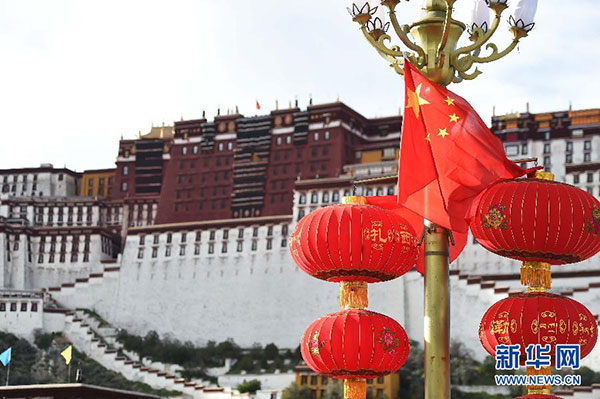|
 |
|
National flags and lanterns are seen on the Potala Palace Square in Lhasa, capital of Southwest China's Tibet autonomous region, Sept 5, 2015. China will hold celebrations for the 50th anniversary of the founding of Tibet Autonomous Region. [Photo/Xinhua] |
The autonomous region will be celebrating the 50th anniversary of the establishment of Tibet autonomous region this month.
The Chinese government has made improving people's livelihood in Tibet the ultimate goal for its Tibet policies.
The central government has promised to let the Tibetan people enjoy better education, stable jobs, more incomes and social security, better health care and cozy living in a beautiful environment.
It also seeks to strength ethnic unity in Tibet to ensure stability, the foundation for development in the region.
According to a meeting of the Political Bureau of CPC's Central Committee in July this year, the government will prioritize ethnic unity and fight against secessionism and promote exchange and prosperity among different ethnic groups in Tibet.
Chinese President Xi Jinping also admonished local authorities against developing the Tibetan economy at the cost of the region's natural environment.
The loss from environmental degradation outweighs economic gains in Tibet, Xi told a party secretary from a county on Tibet's highest altitude during a workshop held in Beijing in January.
The central government has offered preferential policies in the region to stimulate its social and economic development. The Tibet autonomous region is the first in China to provide free education for 15 years starting from primary to high school.
A medical care scheme has covered the entire agricultural and pastoral areas in Tibet. Farmers and herdsmen are entitled to free physical check once a year. Children with congenital heart disease are treated for free. The region's electricity grid has been upgraded and integrated with the network elsewhere in China to ensure adequate supply in wintertime.
Seventy percent of the autonomous region's fiscal revenues has gone to improving people's livelihoods. Most college graduates in Tibet are employed and an expanding social security network has enabled free medical services for herdsmen and care of nearly 6,000 orphans. Some 460,000 rural households have moved to comfortable new homes. The use of central heating system in Lhasa has also terminated the primitive practice of warming through burning cow manure for generations.
